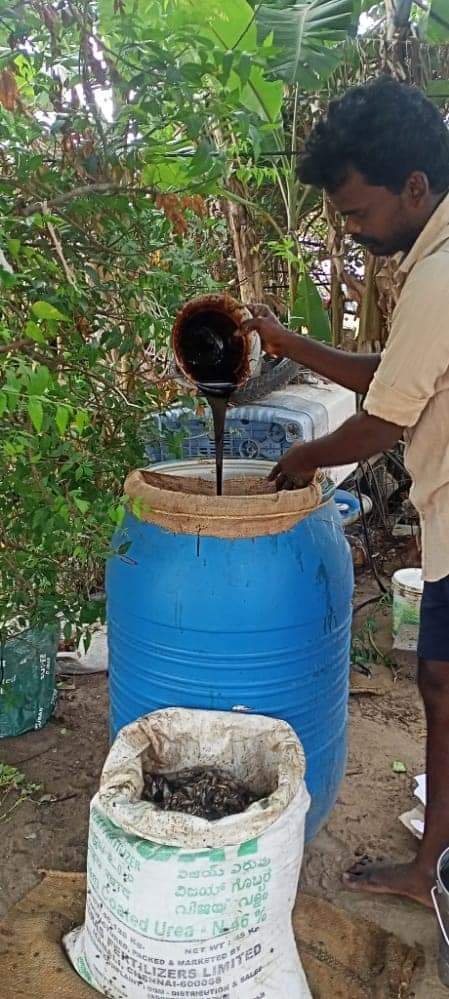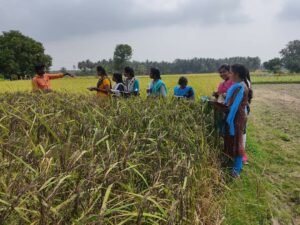Read in : தமிழ்
Seetharaman, 32, did a one-year 3D animation course after completing his BA and was planning to start a small company manufacturing banners and printed items. When he requested his father for capital to start his business, his father asked him a question that got him thinking about what he really wanted to do with life. That turning point made Seetharaman go from wanting to pursue a career in a new-age occupation such as 3D animation to an ancient vocation such as farming. What’s more, he evolved into an expert organic farmer who trains other organic farming aspirants.
Seetharaman’s is a traditional farming family from Vandipalayam near Marakkanam in Villupuram district. Though the family was into agriculture full time, Seetharaman was never keen on taking it up himself. He sought a capital of Rs 10 lakh from his father Nagarajan to set up an animation-based business. Being a son of the soil, Nagarajan asked his son whether he would be able to sustain himself with the 10 lakh rupees he sought, perhaps a rhetorical question, and then went on to convince his son to give their traditional vocation a try. “The returns may not be very high but agriculture is a noble profession as it feeds the hungry; nothing can give you the satisfaction of growing food,” Nagarajan explained to his son.

Seetharaman is now a highly regarded organic farmer. The Villupuram district administration has included him in the farmers’ expert committee that gives suggestions to the state agriculture ministry.
Seetharaman says he decided to give it a shot although he may not have felt fully convinced at the time. He started working with his father on their 15-acre farm.
A few months into farming, Seetharaman realized how much poison was being added into food in the name of agricultural inputs. From seeds to grains, everything was doused in chemicals. He also realized that these chemical inputs were escalating the production cost and that an average farmer made nothing at the end of the season. So, he switched to organic farming.

Organic rice grown at Seetharaman’s farm. A few months into farming, Seetharaman realized that from seeds to grains, everything was doused in chemicals. He soon switched to organic farming.
However, organic farming was not a cakewalk. The soil fertility was heavily eroded due to the indiscriminate use of chemical fertilizers. All his initial attempts in organic farming therefore failed. The family started thinking that he was ruining the income generated from agriculture. Was it a mistake to have prodded him to take up farming?

Seetharaman himself produces organic inputs like Panjakavyam, Amirthakaraisal, Thermore, Arappumore, Fish Acid, neem cakes, herbal pesticide, fermented rice mixture and bio pesticides.
Seetharaman, however, was adamant about mastering organic farming. He started traveling to learn best practices. He went in search of successful organic farmers in North India as well as Andaman and Nicobar Islands where organic farming was predominant. Seetharaman started researching about government schemes available for organic farmers.
The enthusiastic farmer also learnt the organic farming methods of Nammazhvar, the doyen of organic farming in Tamil Nadu. And now, Seetharaman produces organic inputs like Panjakavyam, Amirthakaraisal, Thermore, Arappumore, Fish Acid, neem cakes, herbal pesticide, fermented rice mixture and bio pesticides. “People in agro-centres know all these organic methods and they will be keen to dispose of chemical fertilizers. They are enthusiastic to educate farmers on organic inputs,” says Seetharaman.

Students come to Seetharaman to learn about organic farming methods
Seetharaman started organic farming in 2018. In a few years, he has become an expert and a resource person for the district agriculture authorities. They routinely invite Seetharaman to lecture farmers on organic farming. He also coaches school and college students on organic farming methods.
A few months into farming, Seetharaman realized how much poison was being added into food in the name of agricultural inputs. From seeds to grains, everything was doused in chemicals. He also realized that these chemical inputs were escalating the production cost and that an average farmer made nothing at the end of the season. So, he switched to organic farming.
Of late, Seetharaman has been promoting palmyra tree plantation drives. He hosts campaigns to protect palm trees in the villages. He has also planted 50,000 palm seeds in the villages, procuring each seed for Re 1. The Villupuram district administration has taken note of his venture and included him in the farmers’ expert committee that gives suggestions to the state agriculture ministry.
Seetharaman says there’s a simple mathematics to organic farming. He spends Rs 8,000 per acre and gets a return of Rs 30,000. In regular farming, the input cost will be Rs 20,500 for returns of Rs 45,000. The profit difference between organic and regular farming is just Rs 3,500 per acre. But organic farming has hidden profits, the farmer says.
Seetharaman says there’s a simple mathematics to organic farming. He spends Rs 8,000 per acre and gets a return of Rs 30,000 in organic farmng. In regular farming, the input cost will be Rs 20,500 for returns of Rs 45,000. The profit difference between organic and regular farming is just Rs 3,500 per acre. But organic farming has hidden profits, the farmer says. The soil fertility remains intact and the yield keeps increasing. The food cultivated is healthy.
The soil fertility remains intact and the yield keeps increasing. The food cultivated is healthy. “I don’t think we need to sacrifice our health for such a meager margin,” he added.
Read in : தமிழ்











